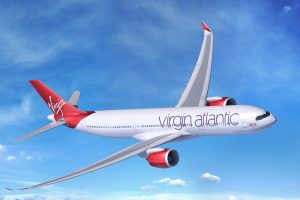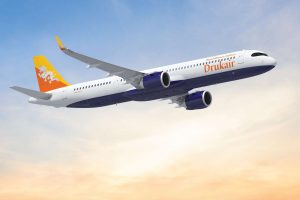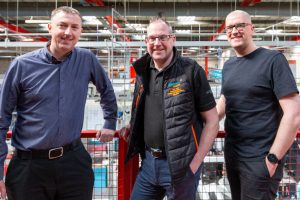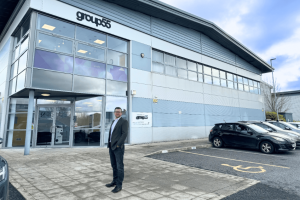Airbus clinches bumper new aircraft deals at Farnborough Air Show

Aircraft manufacturer, Airbus, has signed deals for 43 new planes at the Farnborough Air Show, including 31 for Japan Airlines, seven for Virgin Atlantic, and five for Drukair.
Airbus has major plants in Broughton, near Chester, where it employs 5,000 staff making wings for its commercial aircraft, and Filton, in Bristol, where the workforce numbers 3,000 staff.
Japan Airlines (JAL) signed a firm order for 20 A350-900 widebody aircraft and 11 single-aisle A321neo, finalising a commitment announced earlier this year.
The order was announced during a signing ceremony with Yukio Nakagawa, Executive Officer and Senior Vice President Procurement of Japan Airlines, and Christian Scherer, Chief Executive of Airbus Commercial Aircraft business.
The new A350-900s will join the carrier’s A350 fleet serving international routes, while the A321neo will operate on domestic services within Japan. To date, JAL has ordered a total of 52 A350s, with 18 in service. The A321neo contract represents JAL’s first order for the Airbus single-aisle product line.
Yukio Nakagawa said: “We will accelerate the introduction of the state-of-the-art and fuel-efficient aircraft to provide our passengers with excellent service and to reduce CO₂ emissions. We believe that this additional introduction of Airbus aircraft will further deepen our partnership.”
Christian Scherer said: “We thank Japan Airlines for placing its confidence once again in the A350. In addition, we celebrate a new milestone in our partnership with the airline following its order for the A321neo. We are committed to providing our full support to Japan Airlines as its growing fleet is deployed on more routes across its network, both domestically and internationally.”

The order was announced on board Virgin Atlantic’s A330neo, named ‘Ruby Rebel’, and registered as GB-VSRB after founder Sir Richard Branson, to celebrate the airline’s 40th anniversary.
Shai Weiss, CEO, Virgin Atlantic said: “Today, we complete our multibillion-dollar fleet transformation, with the purchase of seven additional A330-900s, which we know our customers and our people love to fly. Flying the youngest fleet is the most readily available and significant lever towards decarbonising long haul aviation and we are proud to already operate one of the youngest and most fuel and carbon efficient fleets across the Atlantic.”
Christian Scherer, said: “We are grateful for Virgin Atlantic’s decision to expand its A330neo fleet as part of its strategy to have the youngest fleet across the Atlantic. The A330neo greatly enhances Virgin Atlantic’s fleet efficiency and contributes to their sustainability journey.”
Meanwhile, Drukair, Royal Bhutan Airlines, the national flag carrier of the Kingdom of Bhutan, a fully owned subsidiary of the state holding company Druk Holding and Investments (DHI) has signed a Memorandum of Understanding (MoU) for three A320neo and two A321XLR aircraft to expand its international network.
The new aircraft are anticipated to start delivery in 2030. The airline plans to fly these aircraft out of Paro International Airport and the new airport at Gelephu Mindfulness City (GMC), envisioned to become Bhutan’s futuristic economic hub. From here, Drukair will expand its connectivity to Europe, South East Asia and Australia.

Based on His Majesty Jigme Khesar Namgyel Wangchuck’s vision, GMC, located in the southern plains of Bhutan, is emerging as a new economic engine for the Kingdom. As the national carrier, Drukair plays a pivotal role in enabling the prosperity of GMC and Bhutan by efficiently and reliably meeting growing transportation and logistics needs.
Tandi Wangchuk, Drukair CEO said: “We are thrilled to embark on this new chapter in Drukair’s history, which dovetails perfectly with development of the Gelephu Mindfulness City and work to expand the Gelephu airport. Our investment in these state-of-the-art aircraft underscores our dedication to supporting Bhutan’s vision of holistic and mindful development.”
Executive Vice President Sales of Airbus Commercial Aircraft business, Benoît de Saint-Exupéry, said: “We are grateful to Drukair for reaffirming their trust in Airbus to power their next phase of growth. Airbus has been a long standing partner of Bhutan and we are extremely proud that our latest generation aircraft will be a part of the Kingdom’s next chapter of development, connecting the Gelephu Mindfulness City to the rest of the world.”
Drukair is headquartered in Paro, Bhutan, and operates scheduled flights to 10 international destinations, including five countries in the South Asian region. Drukair also operates to three domestic destinations.
As with all Airbus aircraft, the A320 family is already able to operate with up to 50% Sustainable Aviation Fuel (SAF). The manufacturer is targeting to have its aircraft up to 100% SAF-capable by 2030.
Today (July 23), Airbus announced that it, the Air France-KLM Group, Associated Energy Group, LLC, BNP Paribas, Burnham Sterling, Mitsubishi HC Capital Inc and Qantas Airways, have co-invested in a SAF financing fund to accelerate its production.
The corporate partners worked with investment manager Burnham Sterling Asset Management to establish the Sustainable Aviation Fuel Financing Alliance (SAFFA) investment fund in which Airbus is the anchor Investor. The commitment from the seven partners is amounting to an aggregate of approximately $200m.
The company’s recent accomplishments include the acquisition and renovation of the Monarch facility, an ethanol plant located in Sauget, Illinois, USA, which was shuttered in 2019. As of the first quarter of 2024, the plant has completed the upgrades and received the necessary environmental authorisations to resume operations with the aim to produce low carbon intensity SAF and biochemicals.








